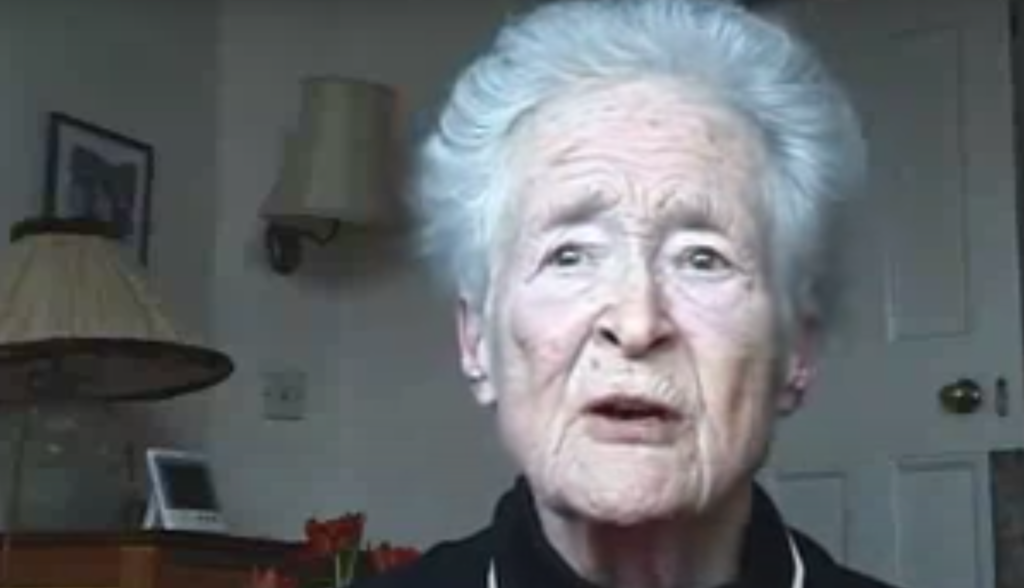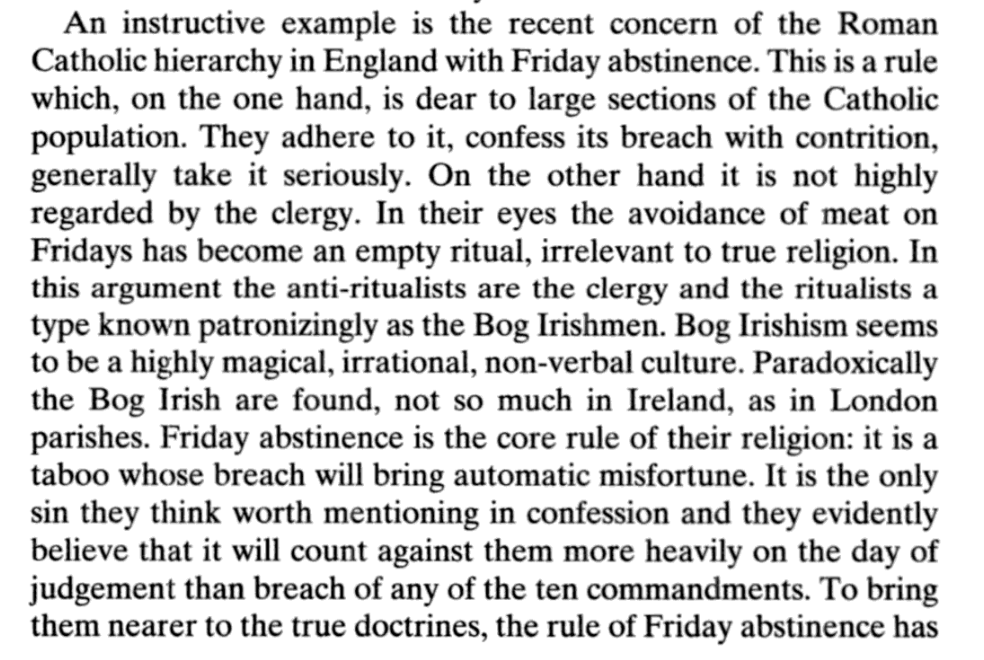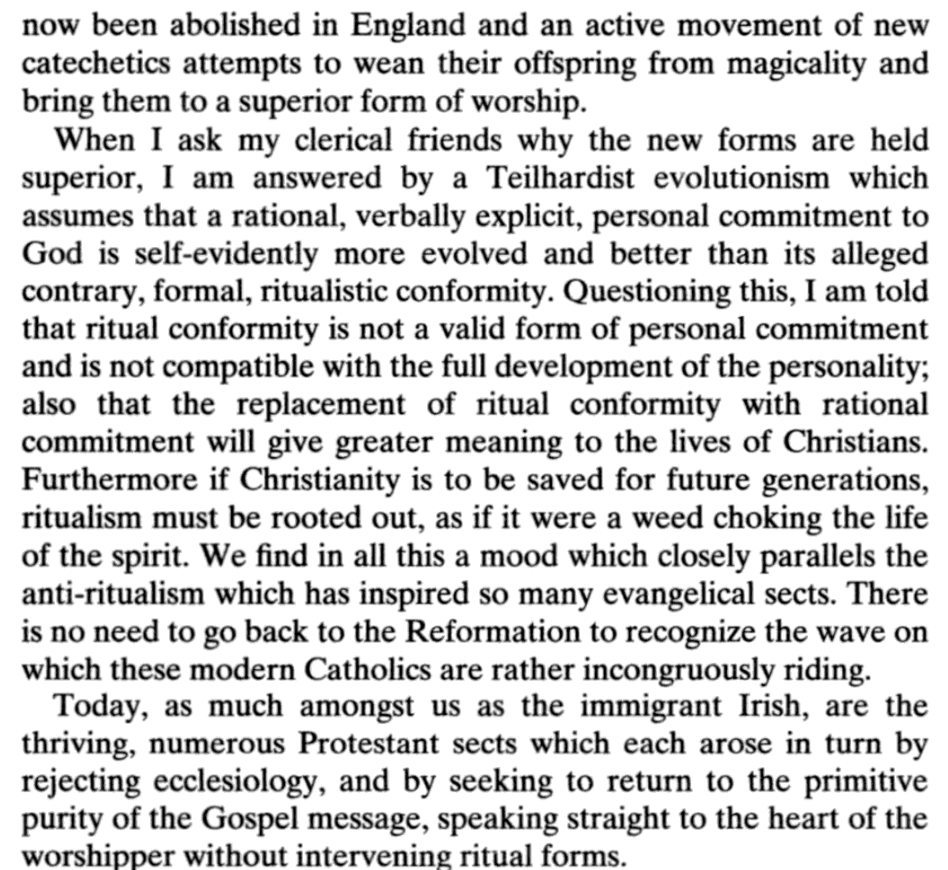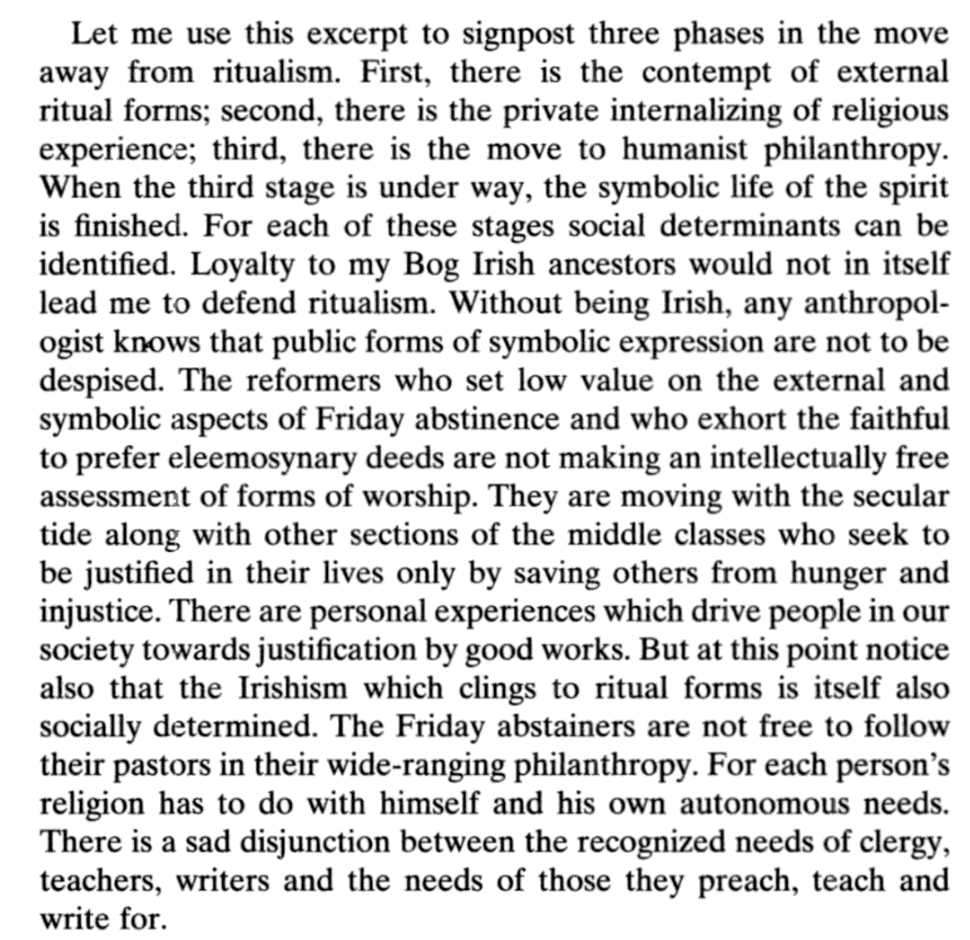Why Should People Go To Church?

Ross Douthat's newsletter is something available only to subscribers of The New York Times, which is perfectly understandable, but too bad if you're the kind of person who first discovered Douthat in his blogging days at The Atlantic. Today's issue is like a blast from that past. I'll quote from it below. Here's how it begins:
A couple of years ago at a party, I fell into a conversation with a friendly older gentleman, an Irish American of the Baby Boom generation and the greater tristate area. At some point, the discussion turned to family life and the challenges of dragging complaining kids to church, and I said something in passing about the Sunday Obligation, meaning the requirement laid on Catholics to attend Mass on pain of serious sin.
He looked at me with a friendly sort of mystification. “Oh,” he said, “but you know the church got rid of that after Vatican II?”
I didn’t really argue with him. Catholicism was deep in his bones, he had been educated by nuns once upon a time, who was I to tell him what his faith really teaches?
But I think about that encounter, and others like it, as intensely relevant to my column from a few weeks ago — on the failure of the Second Vatican Council to equip the church for the challenges of late modernity, the way its reforms aimed at resilience but led to crisis and diminishment instead.
Douthat writes specifically about Vatican II, but his general theme (how to keep late moderns in the churches) is something all Christians -- and maybe all religions -- are facing. He goes on to speak of the Council's policies:
The idea was not simply to make Catholicism easier, of course; the hope was that a truer Christianity would flourish once rote obedience diminished. But the policy and the results, not the hopes, are what we should be interested in three generations later. And in and of itself, a policy of easing burdens was hardly a crazy idea of how the church might adapt to modernity and keep Catholics in the pews. Spiritual issues aside, from an institutional perspective, you can see the logic of saying, the world is making it harder to be a Catholic, so let’s make it easier to practice the faith.
This failed spectacularly, at least in Europe, North America, and Latin America. Africa seems to be the only region of the world where it didn't. More:
From this perspective, a key obstacle to getting modern Catholics to actually practice their inherited Catholicism isn’t whether they disagree with church teachings or feel adequately welcomed (as much as those issues matter). It’s that the church is in competition with a million other urgent-seeming things, and in its post-Vatican II form it has often failed to establish the importance of its own rituals and obligations.
He says the question facing Pope Francis and his liberal Catholic supporters now running the Synod is this:
[W]hich of their reforms would make the church seem more important to the semi-lapsed? How do you reach someone who doesn’t feel unwelcome at Mass but also doesn’t feel any kind of urgency about attending? If progressive Catholicism is in the business of lifting what it sees as nonessential obligations, hastening toward a possible future where one need not even be Catholic to receive communion in the Catholic Church, what form of obligation can it then instill?
The liberalizers don’t believe that a return to tradition suffices for the present challenge. Very well; as a non-traditionalist in my own practice, I’m evidence for their point. But what is the novel means, the welcoming and affirming 21st-century mechanism, whereby my friend from the party, the ancestral Catholic, can be persuaded that it really, truly matters whether he shows up to Sunday Mass?
Douthat's sharp conclusion:
Ultimately, the business of the Catholic Church is to save souls, to serve Jesus Christ and to manifest the presence of God through its holiness and beauty. And as I said in the column, and I’ll say again: What really breeds cynicism is when the church behaves like the Soviet empire in its dotage and demands constant encomiums to the wisdom and success of a now decades-old renewal project, when everyone can plainly see it’s presiding over crisis and decline.
The paradox is that a religion that's not demanding of its practitioners will seem like something unimportant. Reading today's Douthat piece put me in mind of anthropologist Mary Douglas's well-known 1970 book Natural Symbols. If you've heard about the book at all, it's probably in association with her analysis of the Second Vatican Council's ending the requirement that Catholics abstain from meat on Friday. She argued that the "Bog Irish" -- her term for working-class Irishmen in England -- kept the Friday fast despite the efforts of progressive priests to get them to stop, because it was a "condensed symbol" telling them who they were. That is, it signified connection to the past, to Irish identity, and to a cosmology. By casting aside this condensed symbol, Douglas contends, the Catholic hierarchy discarded something far more important than they understood.
Here's a link to a Google Books portion of Douglas's book. I've screenshot some key passages from the opening chapter, which is the only one available. I foolishly left my hard copy back in the US. In the opening chapter, Douglas talks generally about the widespread delegitimization of ritual in the modern world:


And:

I so wish I had the book here with me, so I could go into depth about Douglas's teaching of "condensed symbols" and the Friday fast. Generally, though, her point is supportive of what Douthat says. It is simply not the case -- demonstrably not the case -- that slackening ritualism and requirement in Catholicism has resulted in greater participation in the life of the Church. If you read Gavin Ashenden's fire-breathing and entirely correct column about what the Synod is up to, you can see that the liberals in the Church are pushing the logic of tearing down standards and demands in the name of "radical inclusion." The key point, in light of Douthat's column, is that making the religion about getting as many bodies into the tent as you can is guaranteed to achieve the opposite effect -- because it means that the Church requires nothing much from its communicants other than that they show up. And what's the point of that?
Subscribe Today
Get daily emails in your inbox
Here's a Touchstone review I published in 2001, of a seminary memoir by Chloe Breyer, a liberal Episcopal priest. Note this excerpt:
Our Chloe decides to set up a Bible study for a group of Bellevue patients who are in from Rikers Island, the notorious city prison. She plays a video segment from the Bill Moyers series Genesis. The inmates see Bible scholars agreeing that Genesis gives us plenty of questions, but few answers. Her students don’t get it.
“They’re supposed to be experts, right?” says Tyrone. “So then why are they giving us all this stuff about not having any answers? I mean, it doesn’t take a Ph.D. not to have answers! And if they don’t have any answers, then who does?”
Others chime in with contempt for the equivocating liberal scholars Breyer so admires. Finally, a Muslim convert speaks up. “See, this is what I’m telling you, man. The Koran is the place to go for answers! . . . I became a Muslim because the Koran has the most truth in it. You don’t argue about what it means. You read it, and you know what to do. The Prophet got the word directly from God.”
“Is that right?” asks Tyrone. “Is that how it is? The Koran has more answers than the Bible?” Undeterred, and unable to grasp the significance of the moment, Breyer sets out to teach these poor sinners that the Bible doesn’t have to be taken literally. There are lots of gray areas, she tells them, and they should feel empowered by the fact that they can interpret Scripture any way they like. The inmates are unmoved.
“They want answers, not questions,” Breyer writes. “[T]he more contradictions I point out in the Bible, the more the inmates decide there is no point in wasting their time with a religion that lacks answers.”
Smart cookies, those crooks, who intuitively grasp the worthlessness of Breyer’s baptized sophistries to their broken lives. Their critique is utterly lost on this earnest young woman, who does not know, or perhaps simply does not have the courage or conviction to say to these men, that Jesus is “the Way, the Truth, and the Life.”
One thinks of Ray Browne, the Catholic bishop of Kerry, Ireland, who has punished a Catholic priest for daring to proclaim Catholicism from the pulpit. This will not bring more people into the Church. It only shows that the Church is led by men who don't really believe in Catholicism ... so why should you?